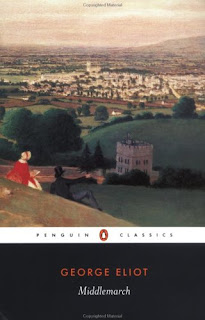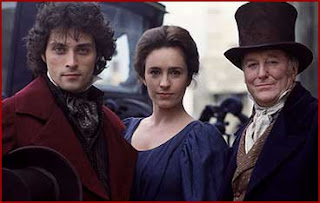I’m fond of really long Victorian era novels. I’d much rather read one of those than 10 modern books. So, like every Saturday Night, here I am to suggest you a Classic to read , as usual it is one chosen among my favourites, again a Victorian long novel. I’ve chosen to introduce you to tonight’s classic with a videoclip. It is set in Italy, my country. Young idealist Dorothea Brooke has just married old Reverend Casaubon and they are on their honeymoon in romantic Italy. But their journey is not at all romantic …
MIDDLEMARCH by George Eliot (1870-71)
If we had to sum up Middlemarch in just a few words, we might say that it's a novel about social and political reform. But it's also a novel about love and marriage. And about trying and failing. And about second chances. It is, in other words, a huge and wide-ranging novel. And we do mean huge: the edition I own is 838 pages long. That's a lot of pages, but then, George Eliot had a lot to say.
But why was Middlemarch so popular? Well, it was socially and politically relevant when it first came out: it was published in 1870-71, just four years after the 3rd Reform Bill was passed in Parliament. Reform was a big deal in 19th-century England. Who would get to vote, and who would take care of poor people, and healthcare, and minimum wages – everyone had some pet reform project they wanted to bring before Parliament. But Eliot didn't want to write a novel about something that had just taken place, so she set the novel forty years earlier, in 1830 – just before the First Reform Bill was passed. Eliot believed that it takes time to understand historical events – it's impossible to understand all the consequences of something right after it takes place. Forty years, Eliot reasoned, was the perfect amount of distance: it's long enough that people have gained some perspective on what happened back then, but it's recent enough that the events are still pretty familiar.
But this epic novel has also a really extraordinary heroine which contributed to its popularity: Dorothea Brooke.
Upper-middle and upper-class Victorian women were expected to "marry money," stay home to raise the family, and be responsible for the management of domestic affairs. As a result, women, who lacked the opportunity for the kind of education men had, were praised chiefly for their ability to act properly towards their husbands. Dorothea Brooke is an intelligent and independent young woman, who differs from the conventional woman of the Victorian Age. While other Victorian ladies worried about fashion and marriage, Dorothea concerns herself with issues of philosophy, spirituality, and service. Eliot points out Dorothea's genuine beauty in describing her physical appearance:
"Miss Brooke had the kind of beauty which seems to be thrown into relief by poor dress. Her hand and wrist were so finely formed that she could wear sleeves not less bare of style than those in which the Blessed Virgin appeared to Italian painters; and her profile as well as her stature and bearing seemed to gain the more dignity from her plain garments, which by the side of provincial fashion gave her the impressiveness of a fine quotation from the Bible, — or from one of our elder poets, — in a paragraph of to-day's newspaper".
(CLICK ON THE URL UNDER THE PICTURE, RELAX AND ENJOY )
OTHER LINKS



5 comments:
It's such a strange coincidence: I recently read "North & South" and I was thinking of re-reading "Middlemarch" soon!
Yay! I'm adding this to my Goodreads "to read" list and will plan on watching this on Netflix's On Demand.
I too love enormous Victorian novels and Eliot's are amongst the best. I really enjoyed the film adaptation.
I greatly enjoyed the movie. I had planned to read it before Cranford but only got into a few chapters when it was overdue and I had to return it to the library.
Thank you for your informative post.
That is my absolute favorite passage in the book--thanks so much for posting it. Dorothea is one of my favorite heroines ever, one that I can relate to and understand, and I am so glad she gets her Will in the end.
Post a Comment